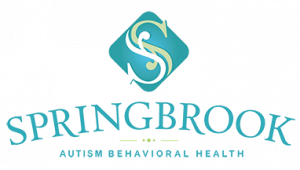Speech Therapy and Nutritional Services

The Springbrook Autism Program takes a holistic approach to behavioral health—while the core of our program is Applied Behavior Analysis, we use many complementary therapies to achieve success with our residents and outpatient clients.
Speech Language Pathology
Springbrook's highly-skilled Speech Language Pathologists (SLPs) have extensive experience with ASD/DD and provide comprehensive assessments to diagnose concomitant language-based learning difficulties, providing daily group therapy sessions that target social and functional communication skills (which may include picture exchange systems). If needed, they may also provide individual diagnostic therapy sessions.
Speech Therapy at Springbrook Autism Behavioral
Overcoming Verbalization Obstacles
For some children with Autism, expressing themselves verbally can be difficult. At Springbrook, our professional Speech Language Pathologists have over 25 standardized assessments at their disposal in order to meet these difficulties head-on. With these assessments, they can determine and help improve a child's skill level in the areas of receptive and expressive language, pragmatic language, phonological and phonemic awareness, reading and writing, figurative language, social communication, vocabulary development, language processing, narrative language, and functional communication. Our SLPs also use non-standardized methods of assessment including speech and language samples, criterion-based resources, and skilled observation.
Springbrook Behavioural Diet & Nutrition Services
Our diet and nutrition services are an important part of overall care at Springbrook. In addition to our in-house chef and kitchen staff who prepare fresh foods from scratch, Springbrook has a [J1] registered dietician on staff who can make healthy substitutions for food aversions, food allergies or intolerances, and other specific dietary concerns while also ensuring the correct nutritional balance of proteins, carbs, fats, vitamins, and minerals.
Addressing Specific Dietary Concerns for Children With Autism
Healthy food is a challenge.
Getting kids to eat healthy food is a challenge for any parent or school, but it’s especially challenging for parents and caregivers who are working with children with autism, who may have strong food aversions and be unwilling to try new things. Proper diet and nutrition for kids with autism is a major concern; children on the spectrum are much more likely to experience malnutrition and eating disorders compared to neurotypical children.
Springbrook’s staff addresses these unique nutritional concerns in several ways:
Cooking Fresh, In-Season Foods
All of our meals are prepared on-site from restaurant-quality ingredients. We use local, in-season produce and other ingredients and as few canned or processed foods as possible. While there’s no direct, scientific link between autism and environmental toxins, there is overwhelming evidence to suggest that processed foods and additives worsen the behavioral symptoms associated with ASD. Establishing a baseline diet of fresh, homemade foods helps our students with behavioral and mental health issues as well as improving their physical health.
Relying Heavily on Finger Foods
Our residential students love finger foods—and are usually more willing to try a new food if it’s presented to them in bite-sized pieces rather than as a full meal. For example, many students who wouldn’t touch spaghetti and meatballs in a bowl will devour a meatball and a piece of bowtie pasta on a toothpick. Plus, finger foods do away with the need for utensils, which can also be an issue for kids with autism. Our typical menu includes about sixty percent finger foods.
Hosting Food Tastings & Rewarding Experimentation
We work diligently with our residential students to increase their tolerance for food and encourage them to try new things. Our regular tasting nights let students try new foods when it’s not mealtime, which relieves some of the pressure for them. We also allow our students to bring stress balls and other comfort items to the table to help them feel less anxious and tense during the meal. Finally, we use our rewards-based program to promote experimentation.
Supplementing the Diet
Even though our caring staff does everything possible to substitute when necessary and encourage proper diet and nutrition, many of our residential students still have difficulty finishing meals. Overall health and wellness is the main goal of our diet and nutrition services, so every student receives a daily, high-quality multi-vitamin to boost their nutritional intake.
Varying Presentation & Offering Substitutions
Springbrook uses a quality meal service that plans our weekly menu and delivers fresh ingredients—and our registered dietician serves as the liaison between our residents’ clinical needs and our menu provider. Each week, our dietician looks over the proposed menu carefully, making needed substitutions based on food allergies and intolerances. Our kitchen staff cooks all meals in-house and gets creative with presentation, working on ways to prepare foods so our residents will accept them. Frequently, students who won’t try a certain food when it’s prepared one way will love the same food if it’s prepared differently. We work with students on their intolerances and give them multiple ways to try a food, keeping in mind the end goal of a more diverse diet.
Our Team of Experts

Maggie Moore
Speech-Language Pathologist
Maggie has been a Speech Language Pathologist since 2007. After graduating from Michigan State University with a bachelor of arts degree in Audiology and Speech Science, she attended the University of South Carolina where she obtained her Master of Speech Pathology (MSP) degree with a specialization in neurogenic speech, language, and swallowing disorders. Her specific area of interest is the brain and the neurological processes involved in communication with the Autism Spectrum Disorder population. She has held full-time staff, supervisory, and director positions in a variety of settings throughout her career, including a multidisciplinary diagnostic team specializing in ASD diagnosis. Maggie also has extensive experience working with stroke, traumatic brain injury, and degenerative neurological diseases.

Dru Filter, MS CCC-SLP
Speech-Language Pathologist
Dru has been a Speech Language Pathologist since 1996. She received her undergraduate degree in Speech Language Pathology from Radford University and her Masters in Speech Language Pathology from Old Dominion University in Norfolk, VA. She has worked in inpatient, outpatient, and home health positions specializing in the areas of feeding and swallowing, childhood apraxia of speech, and the medically fragile population. Dru is new to Springbrook but has worked with many children with autism in all settings throughout her career.
Need to make a referral?
Contact us at (864) 834-8013 to make a referral to our child and adolescent behavioral health program or our inpatient autism programs for children and adolescents.




